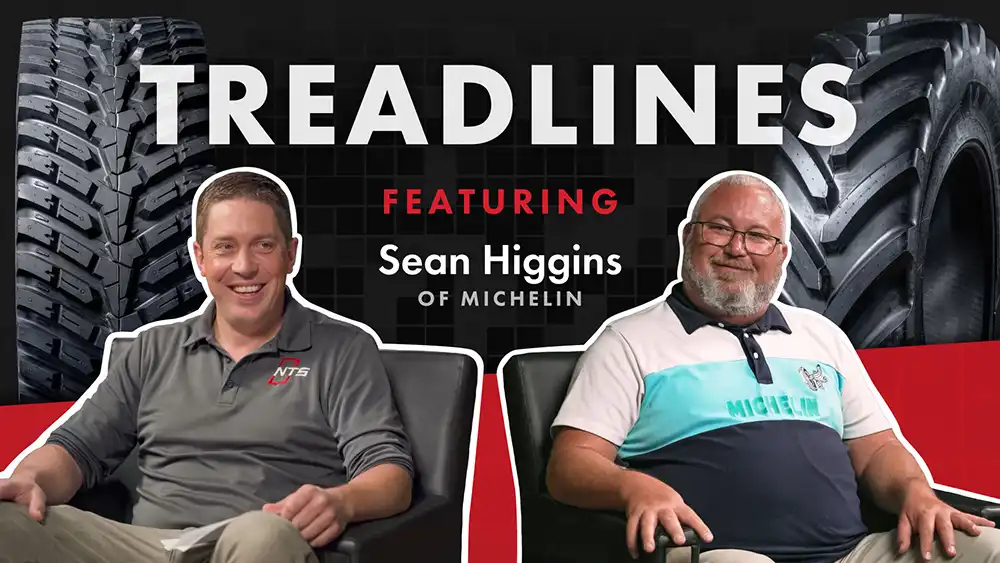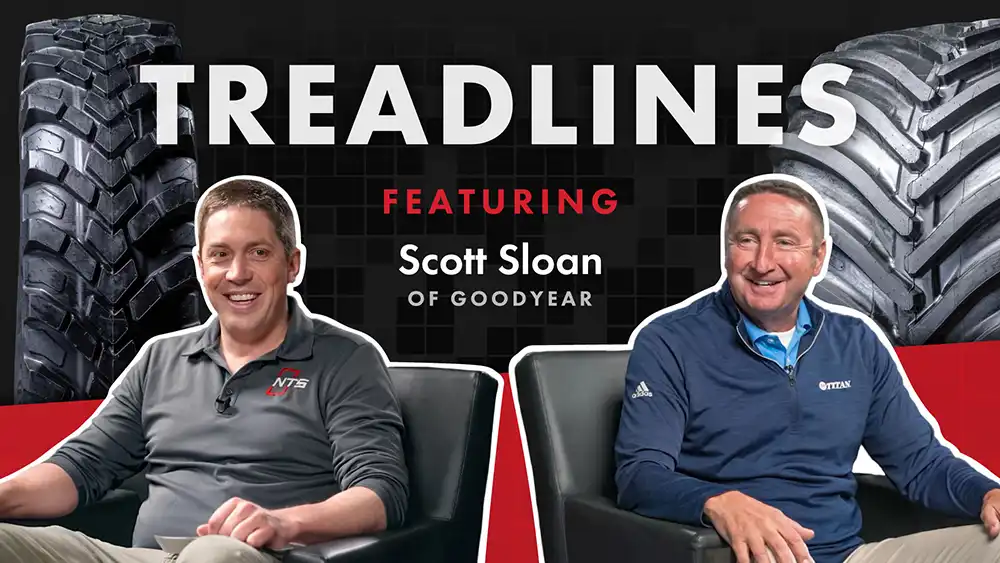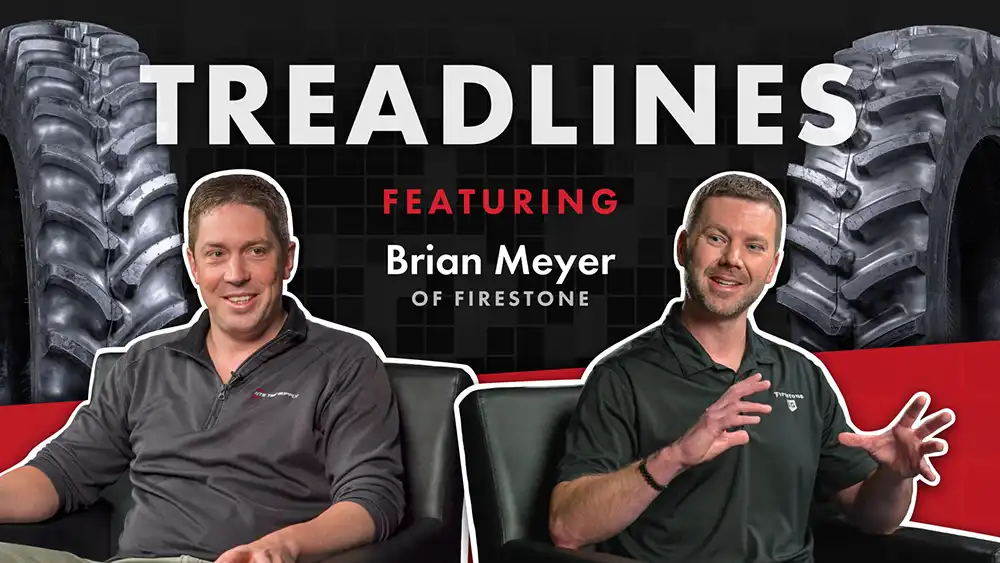Are your planter tires pinching your bottom line? If your planter is still wearing commercial truck tires, the answer is probably, yes. Machine manufacturers used to source their transport tires from the semi world because they can support an enormous amount of weight and are durable. So what’s the issue? The soil compaction created by these tires’ high air pressures and small footprints.

High Air Pressure = Lower Yields
The bulk of a center-fill planter’s weight—the seed, the frame, and often a large liquid fertilizer tank—is centered over the transport tires. A super-single truck tire may require 100 psi or more to safely carry a large, center-fill planter’s loaded weight. For traveling down the road, this is fine: the road is where these tires were originally designed to perform. In the field is where you run into problems. That same 100 PSI will wreak havoc on your yields by causing deep soil compaction.
As you increase a tire’s air pressure, you decrease its footprint size. Smaller tire footprints translate to increased pressure on the soil. From a distance, you can probably see the tracks that these tires leave behind. You may even be able to follow these same tracks with your sprayer weeks later without having to consult your GPS monitor.
What you don’t see from a distance (or even if you’re standing in the tracks themselves), is the damage done to your soil beneath the surface. Root growth is easily stunted by tightly-packed soil, which alone is enough to rob you of yield. (Smaller root systems deliver less nutrients to the plants, and result in lower yield potential.) In addition to stunting root growth, compaction allows water to pond more easily. And tightly compacted soil doesn’t drain well either.
Compaction Created During Planting Could Stunt 25% of Your Field
What if we told you that 25% of every field may be experiencing yield loss to compaction? If you’ve browsed our PTK section on ntstiresupply.com or other tire industry resources, you’ve probably heard of “pinch row compaction.” Pinch rows are the center six rows beside the transport tires and beneath the center of the planter. On a 24-row planter, this means that a quarter of the rows you plant are pinch rows.
How Many Dollars are You Losing to Compaction?
Research has shown that soil compaction can slash yields by up to 15% in a single year. It can also impact your yields for over a decade—even with tillage and no additional compaction.

*Soil compaction occurred on Year 1. The yield loss measured from Year 1 through Year 10 is with tillage and no additional soil compaction after Year 1.
For example, if you brought in 200 bushels of corn per acre, you probably could have harvested 230 bushels per acre without soil compaction. And even if you stop causing new soil compaction (which is unlikely), you will probably lose another 80 bushels per acre over the next 4 growing seasons due to the initial compaction. That adds up to more than 110 bushels per acre lost in 5 years.
To put this into a dollar amount, let’s say corn is $4.25 per bushel and you grow 1,000 acres of it each year. Your lost profit potential over those 5 growing seasons is over $500,000.
A planter-specific study, conducted over three years by Beck’s Practical Farm Research, showed an average yield loss of 12.6 bu/acre from pinch row compaction on center-fill planters. So how do you avoid this?
Fight Compaction and Boost Yields with VF Tire Technology
Let’s take a cue from the OEMs: most (if not all) center-fill planters now come standard with VF radial transport tires—or you have the option to add them straight from the factory. Track systems are another option. But if you have a planter that needs a tire upgrade, VF (very increased flexion) radial tires will carry the weight of your planter at up to 40% lower air pressure than those truck tires.
To combat pinch row compaction and safeguard your yields this spring and into the future, we suggest mounting one of the tire options below. Lower air pressures and extra sidewall deflection allow these tires to put down a larger contact patch than their truck tire cousins. The tires below can help you avoid yield loss from compaction and even make your planter pull easier. It never hurts to save time or fuel, right?

Firestone Destination Turf™
This is our top pick for planters, such as the John Deere DB Series, that mount 445/50R22.5s. Unlike the regular Destination’s rib design, the Turf features a lug tread that’s engineered to deflect stubble (or at least absorb more hazard damage before it’s replacement time). Its wide, flat face and VF rating helps the Turf put down the largest footprint possible, lightening the load on your soil.

Firestone Destination
Firestone’s Destination lineup, with regular rib tread, also features the company’s IF/VF tire technology, called Advanced Deflection Design (AD²). Available in the widely-used 445/50R22.5 size, the ribbed Destination is also available in other popular planter sizes, such as 295/75R22.5 & 265/85R15.

Alliance 381 Agriflex+
The turf-treaded 381 Agriflex+ is Alliance’s premium VF implement radial, which comes in at a slightly lower price tag than the top-performing Firestones. Still, Alliance designed this tire specifically for sensitive applications, where soil protection is a top priority. And even at its lower price tag, it includes a 10-year prorated workmanship and materials warranty. Available in the 445/50R22.5 size, the Agriflex + will fit many popular center-fill models.


BKT Rib 713 & SR 713
Designed with IF (increased flexion) technology, BKT’s Rib 713 is available in the 265/85R15 size and comes in at a lower price. Still, BKT radials pack a 9-year warranty for general workmanship and 3 years of field hazard and stubble damage coverage. If you have a planter that mounts the 295/75R22.5 size, such as a Kinzie, BKT’s SR 713 VF-rated radial is another option. BKT has engineered the 713’s tread for both low rolling resistance and stubble protection.
Stop Pinch-Rows in Their Tracks Before Spring Planting
Planting season is just around the corner, so now is the perfect time to address those semi tires on your planter. From VF tires for your planter to LSW super singles for your planter tractor, NTS Tire Supply offers you a range of products to fight compaction this spring to boost your yields. Call and talk with an NTS Tire Supply expert before spring planting gets rolling and drive your farm forward.

.png)
.jpg)



















